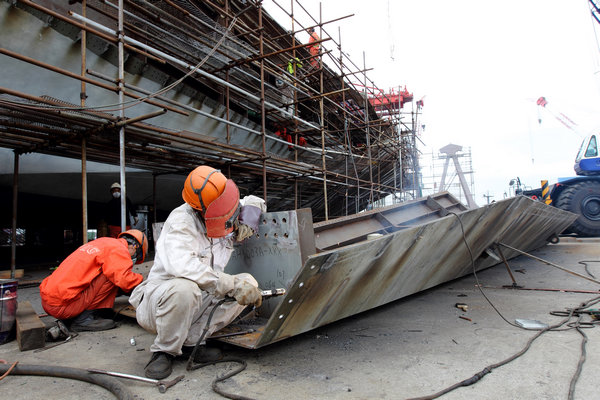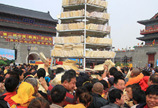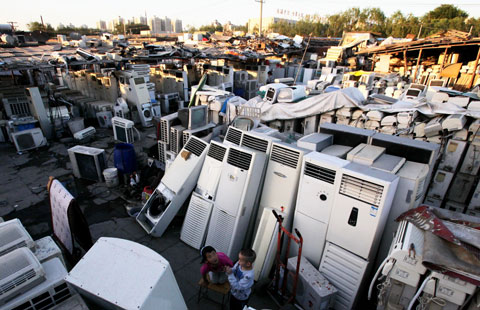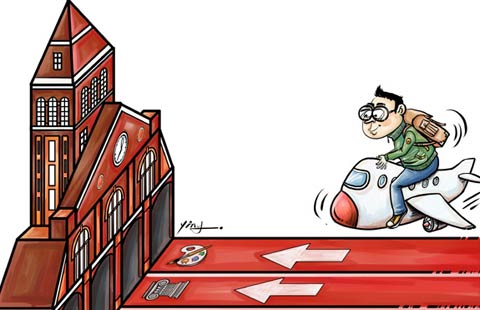Constructive partnership will build foundations
By Zhang Yuwei (China Daily) Updated: 2012-03-06 07:59Money matters
China State Construction Engineering Corp entered the US market in 1985 and its US operation China Construction America is well known by locals.
In New York, CCA is renovating Alexander Hamilton Bridge (between Manhattan and the Bronx) and reconstructing the Staten Island Expressway. It is also building North Charleston Coliseum and River Bluff High School in South Carolina.
Its parent company recently announced a plan to invest $2 billion in the next few years in PPP infrastructure projects, mergers and acquisitions, and residential projects.
Joe Catapano, a project manager for CCA working on the Staten Island Expressway, said Chinese companies offer capital and expertise.
"The key issue is money. It doesn't seem the US government is willing to spend money (on building infrastructure)," said the engineer, who has 12 years of experience working in New York and California. "There isn't financial support for a lot of the infrastructure work that needs to be done.
"High-speed rail is definitely something we can learn from China. We don't have any of that," he added.
The first US high-speed rail line is likely to be in California, with delayed construction of a 350 km/h system to begin in Fresno this year.
California is home to six of the country's 10 most congested metropolitan areas, while the state's population is predicted to grow by more than 20 million in the next four decades.
The California High-Speed Rail Authority estimates that without the new rail system, the state would need to invest $171 billion to acquire the equivalent transport capacity 2,300 miles of new highway, 115 new airport gates and four new runways.
Many American scholars say the Chinese government makes decisions quickly on infrastructure construction and acts effectively.
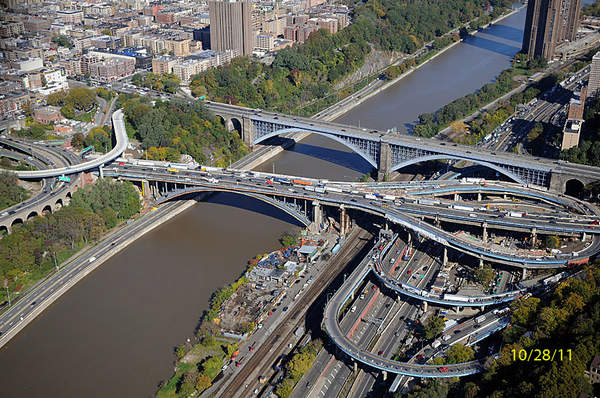 |
|
A bird's eye view of the Alexander Hamilton Bridge in New York, which is being renovated by China Construction America, a subsidiary of China State Construction Engineering Corp. Provided to China Daily |
Thomas Friedman, the New York Times columnist and co-author of That Used to Be Us, argued in 2008 that it is time to "reboot America", citing the need to catch up with the advanced airports and rail stations he saw on a visit to China.
Francis Fukuyama, a fellow at the Freeman Spogli Institute for International Studies at Stanford University, wrote in a Financial Times piece that the "most important strength of the Chinese political system is its ability to make large, complex decisions quickly, and to make them relatively well, at least in economic policy".
This is most evident in the area of infrastructure, he wrote, adding: "Americans pride themselves on constitutional checks and balances, based on a political culture that distrusts centralized government."
Aaron Brickman, deputy executive director for SelectUSA, a program set up by the Obama administration to stimulate foreign investment, said the US is welcoming global companies with expertise and high quality of work for US infrastructure projects at a "difficult time".
"Many US subsidiaries of foreign firms have been very successful here on projects," he told China Daily by phone. "Chinese firms are no different. So there are all kinds of companies from around the world that have established US subsidiaries that bid on and win projects."
However, the involvement of Chinese companies in helping to rebuild US infrastructure is not necessarily popular.
Last year, when California's transport department chose Shanghai Zhenhua Heavy Industries Co China's largest heavy-machinery maker to build the new San Francisco-Oakland Bay Bridge, US industrial groups did not react well.
Luis Alejo, a California assemblyman, said the decision to outsource the project to China had done damage to the state.
"It gives thousands of (US) families those jobs, and then those pay checks and their subsequent spending ends up going back into our (the US) economy. And so now all that money has permanently disappeared from California," he said in an interview with NPR.
Californian officials who were involved in the project, however, believe it was the right way to go, as Zhenhua, which has built some of China's largest bridges, has the expertise and lower cost.
The cost of the project was about $7.2 billion, and having the Chinese contractor build it saved about $400 million (by outsourcing the fabrication of key sections of the Bay Bridge and having other work done locally), according to Tony Anziano, a manager at the California transport department.
Many still see it as a way to "outsource jobs" to China.
Scott Paul, executive director of the Alliance for American Manufacturing, said the US is subsidizing jobs in China by giving them infrastructure projects. "We are not creating any wealth in the US," he said.
Meanwhile, Alaska Iron Workers declared in a recent radio advertisement, "This is not the time to send more jobs to China."
Yuan at CCA said he believes this is a misunderstanding, explaining that his company complies with the "Buy America" sentiment just like any other bidder.
"We offer competitive prices and world-class expertise for all the projects we bid for," he said, adding that 90 percent of his company's 1,000-strong workforce in the US are local hires.
"We only hire local workers for our job sites across the country," he said. "In New York, we only hire union workers, and we have created thousands of jobs over the years."
You may contact the writer through yuweizhang@Chinadailyusa.com
- Seven villagers murdered in N China
- China steps up tobacco control efforts
- Five jailed for separatism in Xinjiang
- Letter asks for leniency in poisoning case
- Antibiotics in surface water pose 'indirect health risk'
- Tianjin airport opens up transit link to Beijing
- High levels of antibiotics in China's major rivers
- China to dig tunnel for Asian rail system
- Bering strait line to US possible, experts say
- China: Stop oil rig harassment
